DARRELL LEE WALTRIP - 02/05/1947
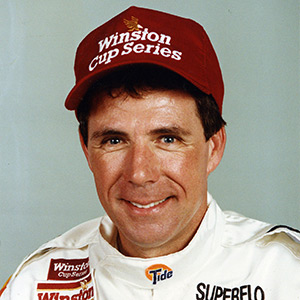
an American motorsports analyst, author, national television broadcaster, former racing car driver, a three time NASCAR Cup Series champion, (1981, 1982, 1985), a three time NASCAR Cup Series runner-up, (1979, 1983, 1986), winner of the 1989 Daytona 500. Waltrip is the winner of 84 NASCAR Cup Series races, including 12 wins at Bristol Motor Speedway, seven of which were consecutive wins beginning in 1981. He is a 2-time winner of NASCAR's Most Popular Driver Award, (1989, 1990), was the "American Driver of the Year", (1979, 1981, 1982), and was named "NASCAR's Driver of the Decade", (1980s). Waltrip started in NASCAR's Cup Series, NASCAR's top racing series at age 25. Waltrip finished 38th in his first NASCAR race after retiring on lap 69 due to engine failure. The car was sponsored by Terminal Transport of Owensboro, Kentucky. The early years found Waltrip competing against legendary stock car racers such as Richard Petty, David Pearson, Cale Yarborough, and Bobby Allison, among others. Waltrip soon earned the respect of his more experienced peers. He was given the #95 as a number but Waltrip preferred car #17 because his
hero, David Pearson, had success with the number in earlier years. His first Cup victory coming at his home track, May 10, 1975, at age 28. Except for five races in 1973, driving for Bud Moore Engineering, Waltrip primarily drove his own cars at the beginning of his NASCAR career until the middle of the 1975 Cup season when he was signed to a multi-year contract and replaced driver Donnie Allison to drive the #88 DiGard Chevrolet. Waltrip would compete in eleven races in the 1975 season for DiGard, sponsored by Terminal Transport, and get his second career NASCAR Cup victory October 12, 1975, in the Capital City 500, in Richmond, Virginia. During the early years of Waltrip's career, his wife, Stevie Waltrip, was the first NASCAR wife to attend the races and sit in the pit box. Stevie learned to calculate fuel mileage, a hugely important function in the sport, and would monitor the race
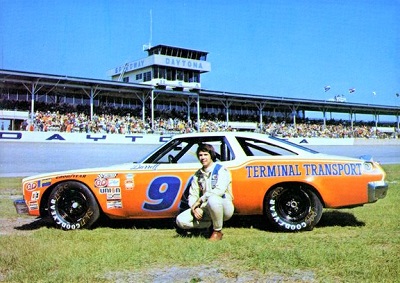
1974 Cup ride
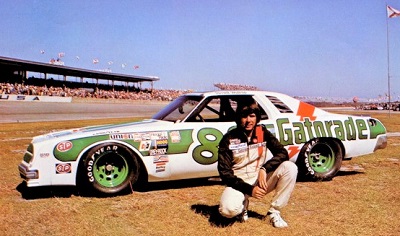
1976-1980 Cup ride
listening to radio communications between the crew chief and Waltrip. In 1976, Gatorade became Waltrip’s primary sponsor as he started his first full race season at age 29, driving the DiGard Gatorade Chevrolet. In 1977 and 1978, working with legendary Nascar crew chief Buddy Parrott, he won six times each year, including his first of four career victories at the Talladega Superspeedway. On September 23, 1979, after winning pole position and leading 184 laps at the Old Dominion 500, at Martinsville, Virginia, Waltrip experienced engine failure. The DiGard team pitted the car and made a rare mid-race engine change in a record 11 minutes. Waltrip closed out the 1970's driving the #88 DiGard Chevrolet, sponsored by Gatorade, ranked
NASCAR's #2 driver, having won 22 NASCAR Winston Cup races in just 149 race starts. His aggressive driving style and outspoken demeanor earned him the nickname "Jaws". The nickname was given to Waltrip by rival Cale Yarborough in an interview after Waltrip crashed Yarborough out of a race. At the height of his NASCAR Cup success in the early 1980s, fans often booed Waltrip, in large part because of his success on the track defeating more established drivers with large fan followings, but also because of his open criticism of NASCAR, his aggressive "take no prisoners", and "win at all costs"
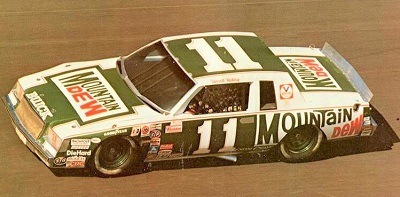
1981-1982 Cup Series
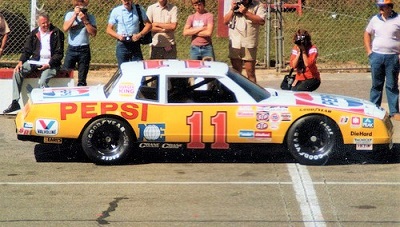
1983 Cup car
approach to driving. But, Waltrip, the constant focus of national media attention, dominated all aspects of the sport in the early and middle years of the 80's. Ironically, it was Waltrip's rival and long-time nemesis Cale Yarborough, the hard-charging, and hugely successful driver for legendary driver/owner Junior Johnson, that privately told Waltrip that he intended to cut back on his racing appearances and leave the highly coveted Junior Johnson team at the end of the 1980 season, opening the position for a new driver. Waltrip, the most successful NASCAR driver at the time, was offered NASCAR's top ride by Johnson, but only if Waltrip could successfully negotiate an early termination of his contract with DiGard for which Waltrip was contractually
obligated to drive the following season. After negotiations with Bill Gardner, and Gatorade's concern with the differences between Waltrip and DiGard, Waltrip bought out his contract with DiGard, driving his final race for them November 15, 1980. The Junior Johnson-prepared cars were considered by most in the sport to be the best ride in NASCAR Winston Cup at the time. Waltrip's success driving the Junior Johnson prepared cars came immediately and even surpassed the highly successful years he had with DiGard. In his first two years as driver for the Mountain
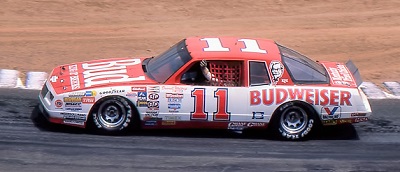
1984-1986 Cup ride - Riverside win
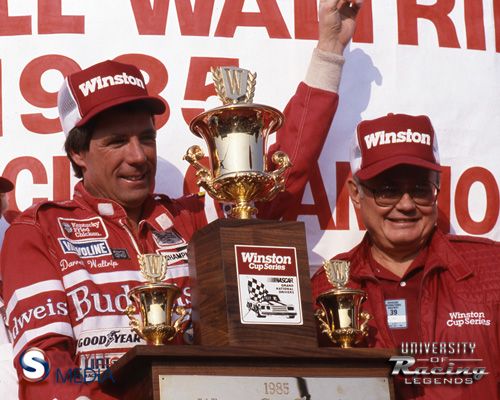
1985 Cup Champion
Dew sponsored, Junior Johnson prepared Buick Regal, Waltrip won 12 races each year. It was during the early 1980s, with Junior Johnson, that Waltrip first worked with Jeff Hammond, a pit crewman for Johnson. Hammond was at first skeptical of Waltrip's driving style since it differed so much from the former driver for whom he worked, Cale Yarborough. Waltrip and Hammond would benefit from each other's knowledge and abilities and would work together for most of their careers in the sport. Waltrip and Hammond work together later also; as broadcaster and analyst at Fox Sports, and Speed TV. Waltrip would continue his unprecedented success driving for Junior Johnson through the 1986 NASCAR Cup season, winning his third NASCAR Cup Championship. Waltrip had opened a Honda dealership in his home town of Franklin, Tennessee, with the help of his friend, Rick Hendrick, owner of Hendrick Motorsports. During the 1986 season, Waltrip and Hendrick discussed the possibility of Waltrip
joining the Hendrick organization, which fielded cars for Geoff Bodine and Tim Richmond and the two discussed the potential of Waltrip moving to a new team. Waltrip was still under contract with Johnson for the 1986 season, but following the year he was able to break the contract in a unique way. Waltrip gained his release by purposely breaking one of Johnson's cardinal rules: asking for a raise (Johnson forbade his drivers from discussing money matters, including raises, with him). After signing, Hendrick formed a third team for Waltrip, carrying the #17 and sponsored by Tide. In 1987, his first year with Hendrick Motorsports, Waltrip had limited success, He won only one race (at the Goody's 500) and had six top-five finishes. In 1988, he won twice, including his fourth Coca-Cola 600 (formerly the World 600) win. In the first
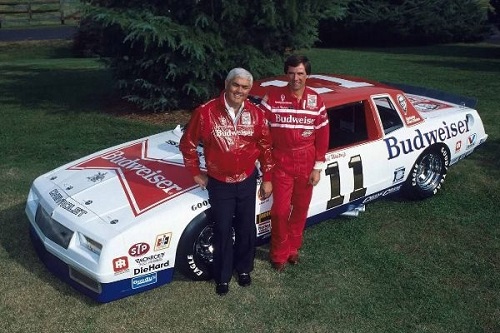
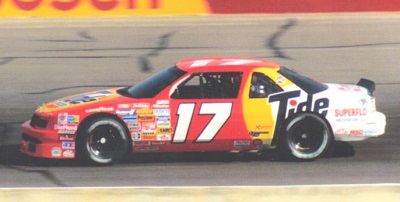
1986-1990 Cup Series ride
scheduled NASCAR event of 1989, the Daytona 500, Waltrip won the race for the first time, in his 17th career attempt with a fuel conservation strategy along with his long-time crew-chief Jeff Hammond, making his final pit stop for fuel a distant 53 laps, (132 miles), from the finish. Jeff Hammond, interviewed by television pit reporters during the final stint of the race, said that his strategy was for Waltrip to "draft off anybody, and everybody", to save fuel. Even though Waltrip's car ran much slower than other cars in the last 53 laps, he was able to avoid making the additional pit stop for fuel that the other cars had to make. Waltrip's popularity as a driver would come full circle on the
evening of The Winston, a NASCAR All Star racing event held May 21, 1989, at Charlotte Motor Speedway. On the final lap, Waltrip was leading the race and poised to win when Rusty Wallace hit Waltrip's car exiting the 4th turn and spun Waltrip into the infield costing him the victory and the $200,000 purse. Not only was Waltrip and his crew upset at being knocked out of the victory, the 150,000 fans watching the race issued boos to the winner, Rusty Wallace. The two crews scuffled in the pits and harsh words were said after the race. Waltrip was quoted after the race as saying "I hope he chokes on it", meaning the $200,000 that Wallace collected for the victory. Waltrip's car was clearly superior to that of Wallace and, had it not been for the contact initiated by Wallace on the final lap, Waltrip would have won the all-star event. During the 1989, and 1990 seasons, Waltrip was voted Nascar's Most Popular Driver by fans. Waltrip would win 6 NASCAR
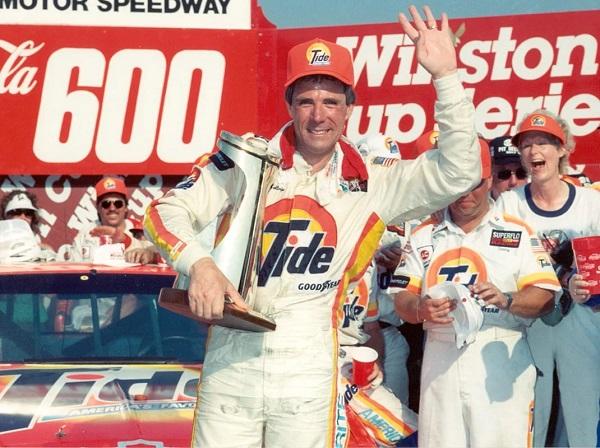
1988 Coke 600 win
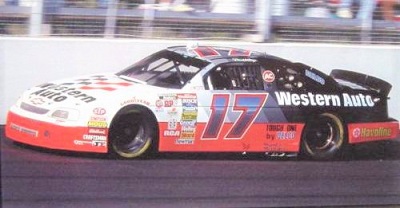
1991-1995 Cup Series
Winston Cup races in 1989. For many reasons, Waltrip was unable to carry his success of the previous year into 1990. Waltrip failed to visit victory lane all season. After his 4th season as driver for Hendrick Motorsports, Waltrip formed his own team to field cars in the 1991 Cup season. Driving his own cars had been his passion since he successfully drove his own cars in his early NASCAR career in the early and mid-'70s. He would continue his relationship with Chevrolet and drive a Chevrolet Lumina with Western Auto as the primary team sponsor. In the 1991 season, Waltrip visited victory lane twice, his first win in his second stint as owner/driver came in only the 7th race of the ’91 season
on April 21, 1991, in the First Union 400, at North Wilkesboro Speedway. Just two races after celebrating his second win of 1991, Waltrip would again be involved in another serious crash, again at the Daytona International Speedway, in Daytona Beach, Florida. It came after completing the 119th of 160 laps. Waltrip’s car slowed and was collected by driver Joe Ruttman’s car, both cars sliding sideways several hundred feet on the grassy infield. The tires of Waltrip’s car clipped the edge of an access road causing it to become airborne and tumbling end over end several times before coming to a stop, up-side down, in a grassy area near turn three. Waltrip was extricated and only suffered minor injuries. In 1992, Waltrip collected three more wins, including the Mountain Dew Southern 500. That would be Waltrip’s 84th, and final NASCAR career victory, tying him with Bobby Allison for what was then third on the all-time list, behind Richard Petty, with 200 wins, and David Pearson, with 105 wins. Both he and Allison have since been passed by Jeff Gordon. At the 1997 UAW-GM Quality 500, Waltrip failed to qualify for the first time in over 20 years. After the season, Waltrip and his team were struggling to find sponsors, but were able to put together a last-minute deal with the Ohio-based company Speedblock for 1998. Speedblock only paid portions of what was promised, and the deal was canceled. Waltrip’s team at this point was nearly insolvent, and he sold the team to Tim Beverly. In 1998 Waltrip signed with Dale Earnhardt, Inc. to drive the #1 Pennzoil Chevy, filling in for injured rookie Steve Park. During his tenure with DEI, Waltrip posted a fifth place finish at the California 500, and led in the final stages of the
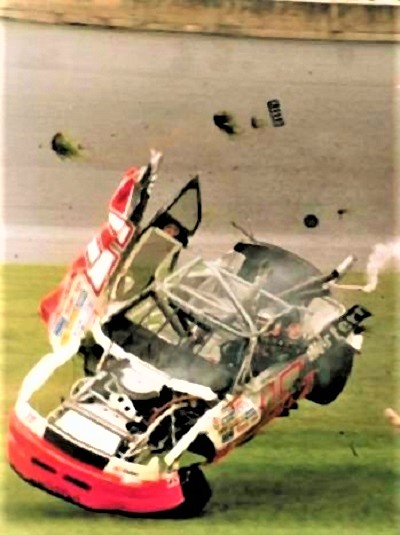
1991 Pepsi 400 crash
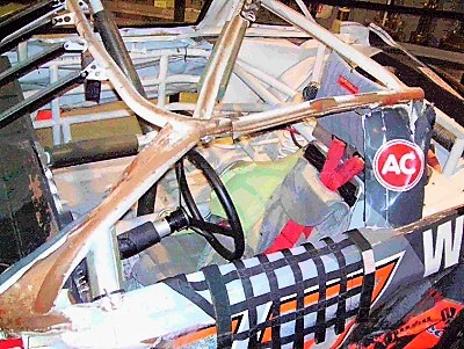
Pepsi 400 crash aftermath
Pocono 500 and finished sixth. In 2008, Waltrip admitted the reason that he failed as a driver-owner team was because he thought like a driver, not as an owner. On August 5, 1999, Waltrip announced during the practice session for the Brickyard 400 that he was to retire from NASCAR at the end of the 2000 season following a farewell tour. After a brief flirtation with retirement, Waltrip signed to drive the #66 Big K Ford Taurus for Haas-Carter Motorsports, and teammate with Jimmy Spencer. Waltrip failed to qualify seven times during that season with a new qualifying rule for the Past Champions Provisional During his retirement year of 2000, Waltrip's best run came at the Brickyard 400, where he qualified on the outside pole and finished eleventh. His final race came November 19, 2000, in the Napa 500, at the Atlanta Motor Speedway. After his 2000 retirement, Waltrip signed with Fox, to be lead NASCAR analyst and race commentator on the network's
NASCAR telecasts, teaming with Mike Joy and Larry McReynolds. Waltrip began his career with Fox, in the 2001 Daytona 500, the first race of 2001. His younger brother, Michael Waltrip, won the race, but Michael's victory was overshadowed by the tragic death of Dale Earnhardt. Earnhardt and Waltrip were bitter rivals on the track during the 1980s. Earnhardt envied Waltrip's status as Nascar's top driver. But, as the year's passed, the rivalry and bitterness gave way to a deep respect and close friendship between the two. On the final lap of the 2001 Daytona 500, Waltrip's joy at his brother's victory to sadness and grief on live national television as Waltrip called the final moments of the race. A week after Daytona, Waltrip interviewed NASCAR President Mike Helton for a pre-race segment during the broadcast at North Carolina Speedway (Rockingham). Waltrip believed that four deaths in the
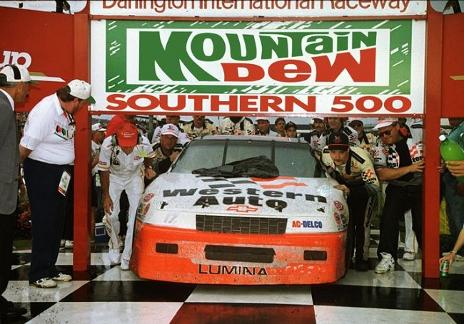
1992 Southern 500 win - Final Cup win
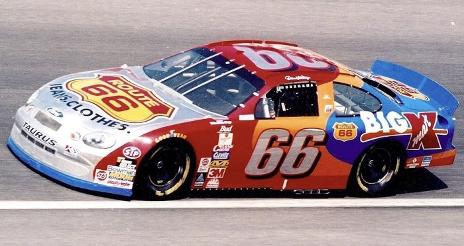
Final Cup start - Atlanta 2000
previous ten months, all caused by basilar skull fractures incurred in accidents, were too many, and was not shy about asking Helton for an explanation. As a long-time advocate for motorsports safety, Waltrip then pushed for mandatory head-and-neck restraints, and two weeks later, demonstrated the device during the broadcast at Atlanta Motor Speedway, explaining the benefits and how the device worked. Seven months later, NASCAR mandated the devices. Waltrip is considered by most in the racing community as a true ambassador to the sport of motor racing. He is a passionate promoter of all forms of racing, especially American stock car auto racing. Waltrip is
recognized by many who closely follow motorsports as NASCAR's first "total package" driver. He was media savvy, articulate, attractive and possessed the driving skills that would take him to the pinnacle of the sport. His style attracted big-budget sponsors that are necessary to fund the multi-million dollar NASCAR teams. As a Fox Sports analyst and broadcaster, Waltrip's opinions, views and comments carry considerable weight with drivers, team owners, fans and NASCAR heads. Waltrip has never been shy about expressing his views, even if controversial. His critical comments about safety have played a significant role in many safety innovations current drivers enjoy today including the "HANS", (head and neck restraining device, credited for saving the lives of many drivers in all forms of motorsports), "soft walls" or "SAFER" (steel and foam
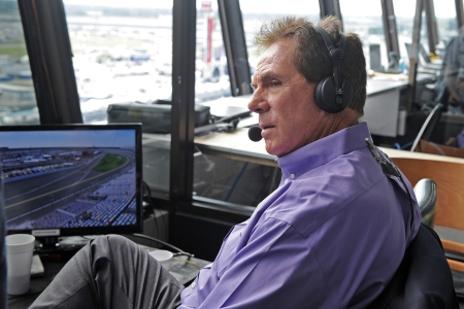

energy reduction), barriers, "full face" helmets, and the new cars now driven by all NASCAR drivers. Waltrip stepped out of his race car and into the announcing booth in 2001. As of 2019 Waltrip retired as a race announcer for the Cup Series on the FOX network channels. For his career Waltrip ran in 809 Cup races in 29 seasons. He posted 84 wins including five wins in the Coke 600 (1978, 1979, 1985, 1988 & 1989); Daytona 500 (1989) and Southern 500 (1992). He was also the king of Bristol and Martinsville. He won 11 times at Martinsville, and won a consecutive seven races at Bristol and 12 total times. During his career NASCAR also raced a Nashville Speedway; a track almost identical to Bristol. Waltrip also claimed 8 wins there. He won the Cup Series Championship in 1981, 1982 & 1985. He ran 95 Xfinity series races winning 13 times. He was inducted into the NASCAR Hall of Fame in 2012. Some info from Wikipedia
All Photos copyright and are property of their respective owners
